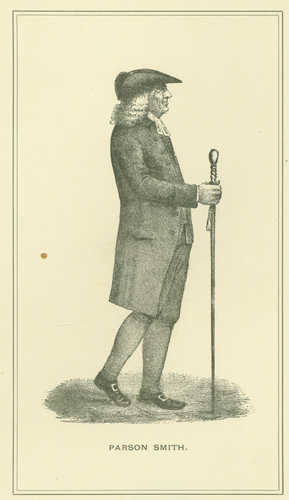Keywords: Indian relations
Item 9435
Indian Land Claims settlement, 1980
Contributed by: Maine Historical Society Date: 1980-03-28 Location: Augusta Media: Photoprint
Item 5750
Indian corn for the Penobscots, 1810
Contributed by: Maine Historical Society Date: 1810-06-19 Location: Bangor Media: Ink on paper
Exhibit
Gifts From Gluskabe: Maine Indian Artforms
According to legend, the Great Spirit created Gluskabe, who shaped the world of the Native People of Maine, and taught them how to use and respect the land and the resources around them. This exhibit celebrates the gifts of Gluskabe with Maine Indian art works from the early nineteenth to mid twentieth centuries.
Exhibit
When Europeans arrived in North America and disrupted traditional Native American patterns of life, they also offered other opportunities: trade goods for furs. The fur trade had mixed results for the Wabanaki.
Site Page
Lincoln, Maine - Catholic Church
"By the mid-1800s, the Penobscot Indians had been practicing Catholicism for years, after being converted by European settlers."
Site Page
"… with the native peoples, especially for furs, but relations with area bands were uneasy. The settlers encroached on the native hunting grounds and…"
Story
30 years of business in Maine
by Raj & Bina Sharma
30 years of business, raising a family, & showcasing our culture in Maine
Story
Margaret Moxa's Blanket Coat
by Jennifer Neptune
A contemporary artwork in memory of Penobscots murdered for scalp bounties.
Lesson Plan
Nation to Nation: Treaties and Legislation between the Wabanaki Nations and the State of Maine
Grade Level: 9-12
Content Area: Social Studies
This lesson plan asks high school students to think critically about and look closely at documentation regarding the Nation-to-Nation relationship between the Wabanaki Tribes/Nations and the State of Maine. This lesson asks students to participate in discussions about morality and legislative actions over time. Students will gain experience examining and responding to primary and secondary sources by taking a close look at documents relating to the Maine Indian Claims Settlement Act of 1980 (MICSA) and the issues that preceded and have followed the Act.
Lesson Plan
Maine's Acadian Community: "Evangeline," Le Grand Dérangement, and Cultural Survival
Grade Level: 9-12
Content Area: English Language Arts, Social Studies
This lesson plan will introduce students to the history of the forced expulsion of thousands of people from Acadia, the Romantic look back at the tragedy in Henry Wadsworth Longfellow's famous epic poem Evangeline and the heroine's adoption as an Acadian cultural figure, and Maine's Acadian community today, along with their relations with Acadian New Brunswick and Nova Scotia residents and others in the Acadian Diaspora. Students will read and discuss primary documents, compare and contrast Le Grand Dérangement to other forced expulsions in Maine history and discuss the significance of cultural survival amidst hardships brought on by treaties, wars, and legislation.














